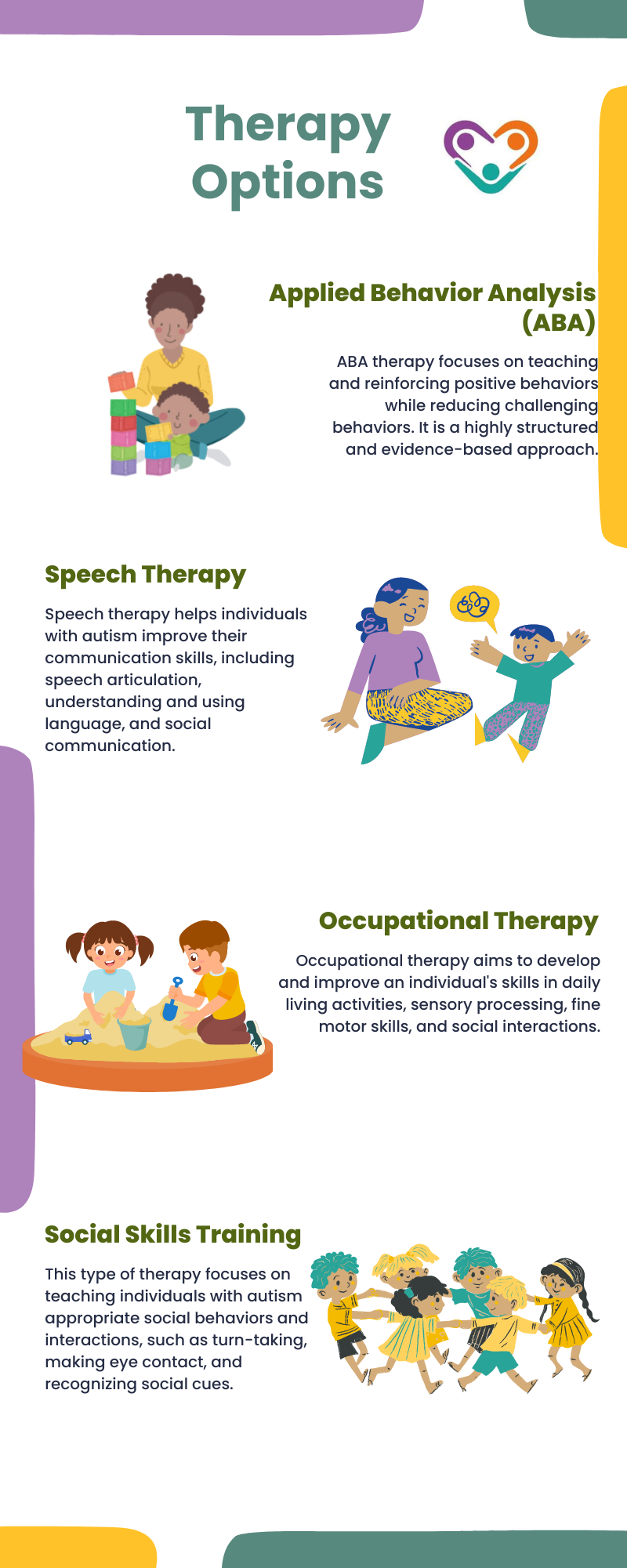Parenting and caregiving can be challenging, especially when a child is diagnosed with autism. It can feel overwhelming to navigate the complexities of their needs, behaviors, and development.
As such, this introduction will aim to provide a clear and compassionate overview of the various supports available for parents and caregivers of children with autism. From understanding autism spectrum disorder (ASD) to finding resources, building a supportive community, and accessing professional help, we’ll explore practical ways to ensure both the child and the caregivers receive the support they need.
Therapy Options
Therapy plays a crucial role in managing autism spectrum disorder (ASD) by addressing the core symptoms of the disorder, which include poor communication skills, obsessive or repeated routines, and physical clumsiness.
Early interventionwith therapy has been shown to yield better outcomes for children with ASD.
There are different types of therapy options available, tailored to meet the specific needs of individuals with autism. Some common therapies include:

It is important for parents to work closely with healthcare professionals and therapists to determine the most suitable therapy options for their child’s unique needs.
Support Groups
In addition to therapy, parents of autistic childrencan benefit from joining support groups. These groups provide a sense of community, understanding, and shared experiences. They offer a platform for parents to connect with others who may be going through similar challenges and to exchange valuable information and strategies.
Here are some well-known support groups that provide autism support for parents:
- Autism Speaks: Autism Speaksis a leading autism advocacy organization that offers a variety of resources, including information, community outreach, online support, education, advocacy, and local activities for families and individuals affected by ASD.
- GRASP (Global and Regional Asperger Syndrome Partnership): GRASPis a nonprofit organization dedicated to improving the lives of individuals with autism and their families. They provide support, education, and advocacy through support groups, workshops, and community events.
- ASPEN (The Asperger Syndrome Education Network): ASPENis a national nonprofit organization that supports individuals and families affected by Asperger Syndrome and high-functioning autism. They offer resources, educational programs, and support groups to help parents navigate the challenges of raising a child with ASD.
- Asperger Syndrome and High Functioning Autism Association: This AHA provides support, education, and advocacy for individuals with Asperger Syndrome and high-functioning autism. Their support groups offer a safe space for parents to share experiences, gain knowledge, and access resources.
Utilizing therapy options and connecting with support groups allows parents to access the necessary tools, information, and emotional support to effectively navigate the challenges and help their child thrive.
Parental Self-Care
Caring for an autistic childcan be both rewarding and challenging. Due to that, parents should also prioritize self-care to ensure their own well-being and maintain their ability to provide support.
We will explore the significance of self-care and offer recommendations for finding personal support.
Why Self-Care Matters
Parenting an autistic child can be emotionally and physically demanding. This can lead to stress and exhaustion, which may impact relationships within the family. Recognizing the importance of self-care is crucial for parents’ overall well-being.
Taking time for oneself without feeling guilty is essential. Engaging in relaxing activities can help parents recharge and better navigate the challenges of parenting an autistic child.
Self-carecan be as simple as walking alone, practicing mindfulness or meditation, pursuing a hobby, or seeking out respite care to have some dedicated time for oneself.
Fortunately, parents of autistic children can benefit from seeking personal support from various sources. Here are some options to consider:
- Friends and Family: Reach out to your support network, including friends and family, who can provide understanding, empathy, and a listening ear. They can offer emotional support and may be willing to help with childcare, allowing parents to take a break.
- Other Parents of Autistic Children: Connecting with other parents who are going through similar experiences can be invaluable. They can provide a sense of community, share advice, and offer support. Support groups such as Autism Speaks and the ones mentioned earlier are excellent resources for finding these connections.
- Local Councils and Resources: Local councils often provide carer’s assessments and support services for parents of autistic children. These assessments can help identify additional resources and support that may be available to you and your family.
- Courses and Workshops: Consider participating in courses and workshops specifically designed for parents of autistic children. The EarlyBird coursefrom the National Autistic Society, for example, offers valuable information, strategies, and support for parents of preschool-aged children with autism.
- Online Resources and Magazines: Online resources like Autism Parenting Magazine provide a wealth of information and support tailored to the needs of parents with autistic children. These resources offer comprehensive overviews of autism, including diagnosis information, behavior management strategies, therapy options, educational resources, community support groups, and more.
Remember, self-care and seeking personal support are not signs of weakness but rather a recognition of your own needs as a parent. Prioritizing self-care can lead to improved well-being and resilience, ultimately allowing you to provide the best support for your child with autism.

Supporting Siblings of Autistic Children
While providing autism support, parents and caregivers should not overlook the needs of the siblings of their autistic children as well. Siblings of autistic children may require special attention and support to navigate the unique challenges they may face.
It’s worth noting that having an autistic child can put a lot of strain on you and your family. It’s essential to recognize that siblings may also experience their own set of emotions and challenges in this situation.
Parents can play a crucial role in meeting their needs and providing the necessary support.
To address the needs of siblings, it’s important to make time for them. Engaging in activities together, such as outings or game nights, can help create positive experiences and strengthen the sibling bond. This dedicated time allows them to feel valued and loved, fostering a sense of support and understanding within the family.
Encouraging open communication is another vital aspect of supporting siblings. Creating a safe and non-judgmental environment where they can express their thoughts and emotions can make a significant difference. Parents should actively listen to their concerns, validate their feelings, and provide reassurance.
This open dialogue can help siblings feel heard and understood, reducing any feelings of isolation or frustration they may experience.
Involving siblings in discussions with health professionals can also be beneficial. By including them in appointments or therapy sessions, siblings can gain a better understanding of their autistic sibling’s condition. It allows them to ask questions, seek clarification, and learn about strategies to support their sibling effectively.
This involvement can empower siblings and encourage a sense of responsibility and empathy.
Additional Resources for Parents and Caregivers
There are a variety of online guides and magazines available that provide valuable information, resources, and support tailored to the needs of families with autistic children.
One prominent resource in the autism community is Autism Parenting Magazine. This online magazine offers a comprehensive free resource guide specifically tailored to the needs of parents with autistic children.
It covers a wide range of topics and provides valuable insights and support. Some of the areas covered by Autism Parenting Magazine include:
- Statistics and facts about autism
- COVID-19 support for families
- Autism diagnosis information
- Behavior management strategies
- Access to services and therapy options
- Educational resources and tips
- Health and diet advice
- Community support groups and events
In addition to the comprehensive resource guide, Autism Parenting Magazine offers specific guides on various topics related to autism. Some of these topics include:
- Stimming and hand flapping
- Managing hyperlexia and hyper numeracy
- ABA therapy
- Activities and play therapy for kids with special needs
- LEGO therapy
- Best autism apps for mobile devices
- Essential oils for autism and ADHD
- Yoga benefits for children with autism
- Probiotics and autism
- Supplements and vitamins for autism
The magazine also provides resources on adult autism and independent living, offering information on choosing the best careers for individuals with autism, transitioning young adults with Asperger’s into the world, and advice on diet, health, and CBD oil benefits for children with autism.

The Key Takeaway
Navigating the journey of raising an autistic childis both challenging and rewarding. By tapping into the right support networks and resources, parents and caregivers can find strength, resilience, and hope.
Remember, you are not alone – there are communities out there ready to support you every step of the way.
Together, we can create a nurturing environment where every child with autism can thrive and shine. If you’re looking for ABA therapy in New Jersey, Indiana, Georgia, and New York, Golden Care Therapy is here to help. Contact usor book an appointment today to learn more about our services and how we can support your child’s journey.



